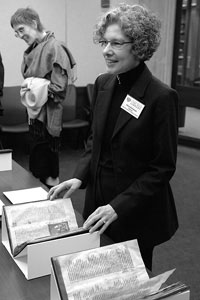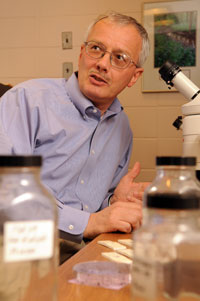Chicago in the News
The Chronicle’s biweekly column Chicago In the News offers a digest of commentary and quotations by a few of the University faculty members, students and alumni who have been headlining the news in recent weeks. Chicago faculty members are some of the most frequently quoted experts, so space allows publishing references to only selected examples. To read many of the full newspaper articles mentioned in this column, visit the In the News column at the University News Office Web site: http://www-news.uchicago.edu.
|
|
There’s no free lunch
Allen Sanderson, Senior Lecturer in Economics, wrote a commentary on Chicago’s bid for the 2016 Olympics, which was published Tuesday, April 22 in the Chicago Tribune. Sanderson noted that when it comes to being in favor of bringing the Olympic Games to the city, Chicagoans must remember the costs and sacrifices of hosting them. Sanderson pondered some possibilities if pollsters asked Chicago residents the following question: “If Chicago were going to spend an additional $1 billion over the next few years on various civic projects, how would you like to see the mayor, City Council and other public agencies allocate that amount of money? Alternatives could be: (a) The 2016 Olympic Games; (b) Shoring up our roads, bridges and public transportation; (c) Putting more police on the streets and in neighborhoods; (d) Public schools and health care; (e) Efforts to make Chicago a greener, more environmentally responsible city. I would be willing to wager a sizable sum of money on where having a public party in eight years would rank on people’s priority list—and how much they would be voluntarily willing to shell out for it.”
Happiness grows with age
As people age, the happier they become, according to new research conducted by Yang Yang, Assistant Professor in Sociology, who analyzed data collected by the National Opinion Research Center between 1972 and 2004 for the General Social Survey. The study results, which were published in the American Sociological Review, note that happiness increases from age 18 to the mid-60s, when the numbers begin dropping but only slightly. People in the 80s, on average, still reported higher happiness levels than people under 40. “Life gets better in one’s perspective as one ages,” wrote Yang. The people who reported being the least happy were those individuals born into the competitive Baby Boom period from 1946 to 1964. Stories on this research appeared in U.S. News & World Report, Canada.com, Science Daily, the Chicago Tribune, the Daily Herald and the Chicago Sun-Times.
Digital, physical books coexist
An article reporting on the future of the book in this digital age featured the University Library’s collections. Part of that collection is the manuscript The Assayer, written in 1623 by Galileo, which includes the great astronomer’s handwritten correction in the margin of one of its pages. The Library’s collections also include the 14th-century illuminated manuscript Le Roman de la Rose, created about 1365. Published in the Chicago Tribune and reprinted in the Los Angeles Times, the article noted that books have not lost their appeal or value, and Chicago students use the University Library heavily for research and personal enjoyment. “Our library is very heavily used,” said Judith Nadler, Director of the Library. “The digital and the print-based will continue to coexist. We don’t want the electronic instead of the book. We want the electronic and the book.” Nadler and Alice Schreyer, Director of the University Library’s Special Collections Research Center, were both quoted and photographed for the article that appeared in the Chicago Tribune. Schreyer pointed out the value of books’ physical presence, especially those that are rare. “There’s an emotional rapport you get with an era by holding a relic that is hundreds of years old. Part of the history of a book is—who were the people who touched this book at every stage in its life?”
|
|
We need feedback
Steven Levitt, the Alvin Baum Professor in Economics and the College, was featured in a Q&A that was published in BW Chicago. Levitt discussed his 2005 book, Freakonomics, written with his colleague Stephen Dubner, and addressed questions about his work as an economist. When asked if he did consulting work, he responded: “I’ve got CEOs banging down the door asking me to solve their problems. It helps that I work for free. My latest idea is about feedback. We cannot learn without feedback. A lot of business is set up right now so they’re swinging a golf club, but they have no idea if they’re slicing into the woods.”
Adapting to North American culture
Charles Lipson, Professor in Political Science and the College, and Tamara Felden, Director of the Office of International Affairs, were interviewed as guests on WGN Radio on Thursday, April 17. The program featured a discussion of Lipson’s newest book, Succeeding as an International Student in the United States and Canada, for which Felden was a reviewer.
Breast cancer and alcohol
A University study that found that postmenopausal women who drink alcohol are increasing their risk for breast cancer was reported Sunday, April 13 on the Reuters newswire. At the American Association for Cancer Research’s 2008 meeting, researchers reported that women who had even one or two drinks per day were 32 percent more likely to develop a hormone-sensitive tumor, but those who had three or more drinks increased their odds by as much as 51 percent. “Regardless of the type of alcohol, the risk was evident,” said Jasmine Lew, a fourth-year medical student and a researcher at the National Cancer Institute. The study analyzed more than 184,000 women.
Open science computation
The Blue Gene/P Supercomputer at Argonne National Laboratory was featured in a Tuesday, April 22 story in the SouthtownStar. Several government officials helped flip the ceremonial switch on the $165 million supercomputer, the second-fastest in the world. Raymond Bair, Chief Computational Scientist in the CELS Directorate at Argonne, said researchers throughout the country will be invited to submit proposals to use the 36-ton machine in an approach he called “open science computation.” “We have large machines dedicated to the kind of science you couldn’t do on a smaller system. We operate them as a resource to the community.”
![[Chronicle]](/images/sidebar_header_oct06.gif)

